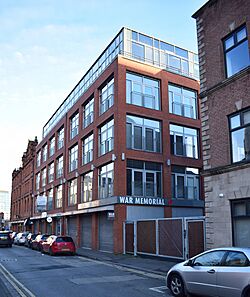Northern Ireland War Memorial facts for kids
 |
|
| Lua error in Module:Location_map at line 420: attempt to index field 'wikibase' (a nil value). | |
| Established | 2007 |
|---|---|
| Location | 21 Talbot Street, Belfast, BT1 2LD United Kingdom |
The Northern Ireland War Memorial is a special museum in Belfast, Northern Ireland. It opened in 2007 on Talbot Street. This museum helps us remember the brave people from Northern Ireland who were part of the First and Second World War. It also honors the American soldiers who stayed in Northern Ireland during World War II.
The museum replaced an older building called Memorial House. That building was on Waring Street, a place that was bombed during the Blitz in 1941. Today, the War Memorial has an exhibition about life on the "Home Front" during the war. It also has the first national memorial for the many people who died in the Belfast Blitz. This memorial was created by artist Carolyn Mulholland.
Contents
How the Memorial Began
The idea for the Northern Ireland War Memorial started right after the Second World War ended. The British Legion, a group that helps former soldiers, wanted to create a place to remember those from Northern Ireland who died in both World Wars.
The government of Northern Ireland, led by Sir Basil Brooke, also wanted to honor these sacrifices. They also wanted to remember the strong friendships made with the many American soldiers who passed through Northern Ireland. About 300,000 US soldiers were in Northern Ireland during the war.
Fundraising for the Memorial
In 1948, everyone worked together to create the Northern Ireland War Memorial Building Fund. By 1950, the Council of the Northern Ireland War Memorial was officially formed. Sir Norman Stronge became its first chairman.
The Northern Irish Government promised to match every pound raised, up to £100,000. The Belfast Corporation, which was like the city council back then, agreed to find a good spot for the new building.
Many fun events were held to raise money across Northern Ireland. The main office for fundraising was unique: it was made from three old tramcars joined together! These tramcar offices were in 'Blitz Square' on High Street in Belfast. Sir Basil Brooke opened them on November 16, 1948. People raised money through things like international football games for women and even by raffling off slices of a huge two-tonne fruit cake!
Building Memorial House
After almost ten years, work finally began on the Northern Ireland War Memorial Building, also known as Memorial House. A site was found on Waring Street in Belfast. This area had been home to many businesses before being destroyed by bombs on May 4-5, 1941, during the Belfast Blitz.
Memorial House was finished and opened in October 1963. HM Elizabeth, the Queen Mother attended the opening. She said that the memorial was more than just a building. It would be a welcoming place for groups like the British Legion and other organizations that help former soldiers. She noted that their work was just as important then as it was during the war.
Moving to a New Location
Memorial House stayed open to the public for many years, even during the time known as Northern Irish 'Troubles'. It hosted different groups and activities, including a small claims court and church services.
In the late 1980s, people decided to create a Home Front Heritage Centre inside Memorial House. This center aimed to teach everyone about Northern Ireland's special role in the Second World War. The Heritage Centre opened in 1989. It continued to operate until 2007, when Memorial House was sold. All the museum's activities then moved to its current location on Talbot Street.
What the Museum Does Today
Today, the Northern Ireland War Memorial is an official museum. Its main goal is to share the full and true story of Northern Ireland's part in the Second World War. It does this through:
- Exhibitions
- Books and other publications
- Research
- Educational programs for schools and the public
The museum also looks after war memorials for those who died in the First and Second World Wars, and the Belfast Blitz. It organizes respectful events to remember these important times. It also provides offices and meeting spaces for charities that help former soldiers. Sometimes, it gives small grants to projects that match its goals.
See Also
- Somme Heritage Centre
- The Cenotaph, Belfast
- List of public art in Belfast
External Links
- Northern Ireland War Memorial
 | Madam C. J. Walker |
 | Janet Emerson Bashen |
 | Annie Turnbo Malone |
 | Maggie L. Walker |

